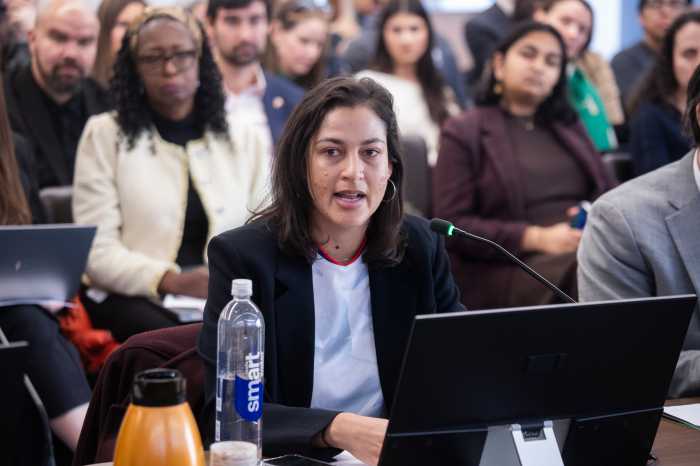A Queens-based education analyst says the current contract sparring match between the city and the teachers union, "has hit new lows, in terms of rhetoric, obstinancy and talking past one another."
Douglas Becker, who has advised both school districts and teachers unions, said each side needs to "tone down the rhetoric, and get down to the hard, dispassionate business of reconciling differences and finding common ground."
"Right now, what we have is akin to the dialogue between a sports agent representing an athlete and a sports team: its rhetoric for dollars, " said Becker, holder of a Masters in Public Administration, and an education / public policy consultant who has advised school districts and teachers associations in the northeast for more than a decade. Beckers public policy specialization includes collective bargaining and mediation.
On March 26, the United Federation of Teachers, the union representing public school teachers, moved to have its contract talks with New York City declared at an impasse in the hopes that a state mediator would intervene.
The current contract between the city and the UFT expired on May 31, 2003, and since that time both sides have accused the other of stalling and not responding promptly to inquiries and proposals.
The Bloomberg
Proposal
The Bloomberg administration has proposed virtually eliminating the existing 200-page contract that has given the city’s 80,000 teachers a large say in how the school system is run for more than 40 years. Instead, the administration has offered an eight-page, bare-bones contract that the union president, Randi Weingarten, has called "an insult" and "unacceptable."
In the past, teachers have agreed to uniform pay increases in exchange for ten or twenty minutes of extra work. In Mayor Michael Bloombergs proposed contract, teachers would work until they get their jobs done and win raises if they do them well. Some council members have speculated why the teachers union would not be in favor of that change:
"The rhetoric that Randi uses is, she wants teachers to be treated as professionals, but the contract shes defending treats teachers as factory workers, as clock punchers," said Councilwoman Eva Moskowitz, the City Councils Education Committee chair who spent much of last fall analyzing the contract in public hearings. "And theres a tension there. We need to compensate teachers like professionals, but we also need to allow a flexibility in how those professionals can do their jobs."
Becker predicted Bloomberg would win on most points in this category but he added that no one should expect 100% of private sector conditions to prevail in the public sector, and certainly not immediately in public education.
"More flexibility is needed," Becker said. "That is the trend nationally, and its been demonstrated that once its implemented it is positively correlated with increased student learning in a school. But flexibility is only one part or slice of the solution pie. For example, flexibility will not prove very effective if a school system is not staffed adequately. Class size remains a legitimate issue. Class size must be reduced particularly where whole groups of students are underperforming, or flexibility solutions will not have their intended impact."
No Progress At Table
After five negotiating sessions, including four in the last two months, Weingarten called an emergency meeting on March 27 at which about 900 union delegates voted to declare the talks deadlocked and to ask the state’s Public Employment Relations Board to declare an impasse, a first step to binding arbitration.
"This action follows six months of fruitless and only occasional talks, which in turn followed four months with the city refusing to talk to us at all," Weingarten said at a news conference.
The city labor commissioner, James F. Hanley, who is leading the negotiations for the Department of Education (DOE), issued a statement saying the city was still willing to talk.
"We stand ready, willing and able to negotiate a contract with the UFT at the bargaining table," Hanley said in the statement. "But we will not negotiate this contract through the press."
Charge And
Counter-Charge
Weingarten accused Bloomberg of trying to stall the contract talks. Last month, the city demanded that its eight-page contract be adopted for all schools, prompting Weingarten to warn that a deadlock was inevitable.
Kathryn Wylde, president and chief executive of the Partnership for New York City, a business group that has pushed the two parties to work more closely together, said she was disappointed by the stalled negotiations. "It’s very discouraging to folks who want to see the reform effort succeed," she said.
DOE officials have also discussed a strategy of seeking to embarrass union leaders while reaching out to teachers.
This month, in an effort to communicate directly with teachers, the department distributed the first issue of a newsletter called Connections.It included a front-page letter to teachers in which Schools Chancellor Joel I. Klein acknowledged some teachers’ complaints about micromanagement over issues like bulletin boards, how seats are arranged in classrooms and the number of minutes for certain types of lessons.
Becker said the Bloomberg Administration was "within its power, to publish and distribute the newsletter," but that the better tactic would have been to hold-off publication, until they see at least "minute progress after long hours at the negotiating table."
"The newsletter tactic probably angered the teachers union to the point where they now may not even want to venture to the negotiation table," Becker said. "The problem from the start has been that these two sides are still at square one: each side wants to win, not find a solution. And as long as that is the case, well see little progress. The key is getting each side at the table and reviewing issues point by point. Right now theyre just talking past one another. Weve got to restore the dialogue because at the end of the day, we need teachers to teach, but the city also needs a rational education contract."






























